Take a look at the coffee journey on both sides of the English Channel
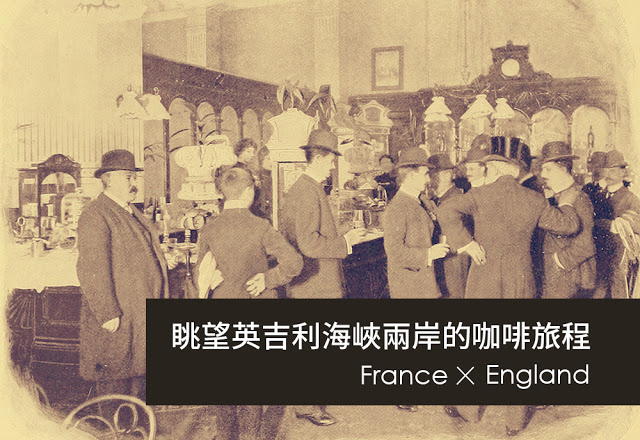
For professional baristas, please follow the coffee workshop (Wechat official account cafe_style)
After the end of the era of arrogant navigation, both Britain and France became the great powers in Europe in the 19th century, and the existence of coffee shops represented the special significance of equality and revolution for them.
The beginning of the History of European Coffee
As early as when coffee first appeared, because it was thought to affect nerves, Islam regarded it as "devil's medicine", while Catholics called it "devil's drink". They are more or less questioning the efficacy and awakening power of coffee that cannot be proved scientifically. The first British literature on coffee was in 1637, when John Evelyn's diary mentioned that a Turkish refugee brought coffee to Oxford, which made the drink shine in Oxford. Many professors and students fell in love with coffee because they thought coffee was helpful to research and reading.
In 1652, the first coffee shop, Pasqua Rosee, appeared in London, England, which was located in an important commercial center at that time, as well as near the London Stock Exchange. At that time, because of the class restrictions on the London Stock Exchange, people who were unable to enter gathered in Pasqua Rosee, making the coffee shop an important stronghold for over-the-counter trading and the exchange of stock information, and sometimes the stock trading volume even exceeded that of the exchange, winning the laudatory name of the "second Stock Exchange."
To the British, the coffee shop was an important place for them to discuss business, exchange knowledge, promote ideas and exchange information. at that time, regardless of class status, they could enter for as little as a penny (1 penny). Therefore, the British coffee shop also had the nickname "Penny University", which meant that they could get unlimited learning opportunities without spending too much money.
Across the English Channel, facing Britain is France, the "literati republic" famous for the Enlightenment in the 18th century. At that time, France was at the center of European cultural development, and many enlightenment philosophers combined with thinkers from other parts of Europe, which made Cafe Procope become an important distribution center of French literature, art, knowledge, political thoughts and institutions after 1720. The more famous encyclopedic thinkers such as Rousseau, Voltaire and Diderot often gathered in this coffee shop to stimulate each other's ideas and promote the germination of various new ideas and ideas of the Enlightenment.
In the coffee shop in Paris, France, many new ideas that broke through the tradition, including the concepts of freedom, democracy and equality, were born and spread, and these ideas became the driving force of the French Revolution in the future. it is not too much to say that the coffee shop was a hotbed of revolution at that time. The coffee shop is to the literati like the contemporary French poet Honor é de Balzac, who said, "I'm not at home. I'm on my way to the coffee shop."

The fate of British coffee has always been rugged and ill-fated. Not long after it prevailed in the early 17th century, the main trade goods of the British East India Company changed to tea as the crown. Therefore, Britain is called "the first country to drink coffee but become a tea culture". Compared with the British tea-drinking society, France is more exquisite about tasting coffee. A cup of coffee is not only matched with the sunshine and time of the whole afternoon, but also attaches great importance to the environment and sentiment, reading, writing and talking at the small coffee table by the side of the road. French people drink coffee while reading books and newspapers, while tasting the warm and leisurely in their hands, which can be said to be a kind of luck in life.
Here are some well-known coffee shops in Britain and France to share with you:
Although modern Britain is still dominated by tea, it is still not inferior in the field of coffee. British coffee shops are full of modern art and creation, and they are also very meticulous in the skills of roasting and brewing coffee. it is a good place with both taste and quality.
The UK
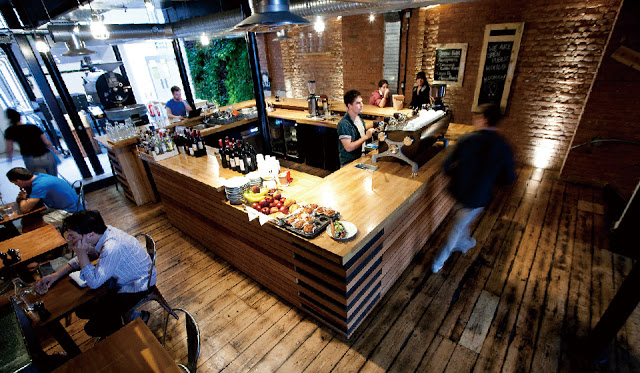
Workshop Coffee
Photo Source: Workshop Coffee
Workshop Coffee in London, England is famous for its best baking skills, and advocates serving every customer with the cleanest taste, freshest and most rewarding coffee, so some people say that the coffee here is the best coffee in London.
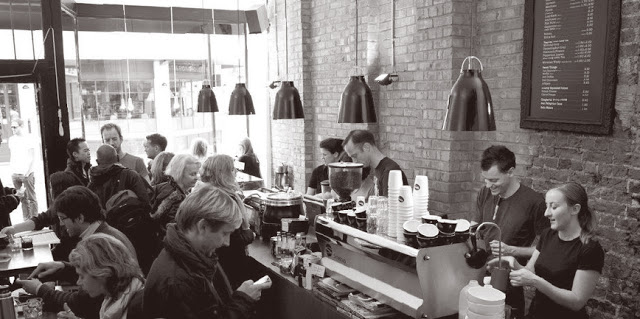
Kaffeine
Photo Source: Kaffeine
When you think of coffee in London, you must also think of this Kaffeine, which was ranked by the magazine as the second of the 25 cafes you must go to!
Kaffeine is committed to the pursuit of perfect coffee, so high-quality service and the store's most famous exclusive coffee combination-concentrated, cappuccino, ice drop, can be said to be the most ramming coffee shop admired by many people!
France
On the cultural left bank of Paris, France, there are two cafes only a few steps apart, but each has its own characteristics and its own time. Both cafes existed in the 19th century, separated from different groups of intellectuals and scholars, and played an indispensable role in the revolution.
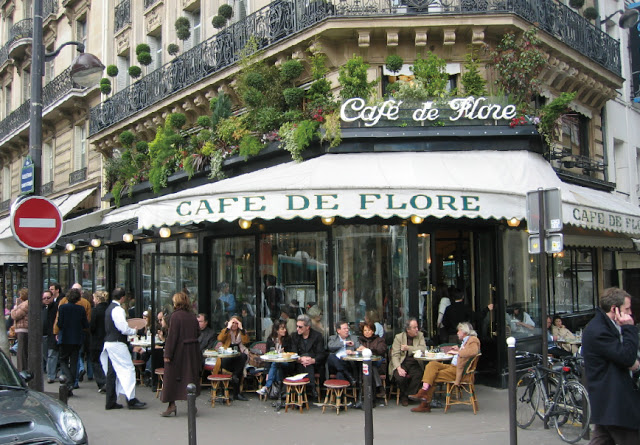
Coffee é de Flore, Huashen Cafe
Photo: Wikipedia
At the end of the 19th century, the Flower God Cafe was the stronghold of the activities of the members of Operation France, and it was also the place where Saudi Arabia and Simon Bova advocated "existentialism" together. Because of its location on the corner of St. Germain Avenue and St. Benoit Street, it is famous for its many well-known customers and has hosted many elites and intellectuals since ancient times. In 1994, Fr é d é ric Beigbeder even set up the Literature Award, which is presented every year at the Flower God Cafe.
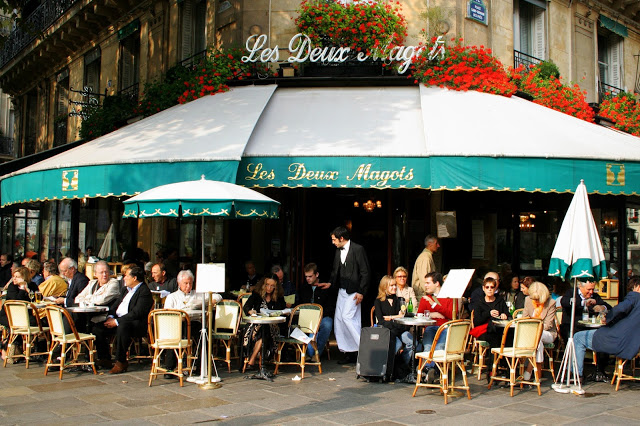
Double Old Cafe Les Deux Magots
Photo: Wikipedia
Also known as the "double Cafe", also began in the 19th century as a small shop dealing in Chinese silk and antiques, and later changed to a coffee shop selling liqueur. The most famous is a pair of porcelain puppets in the store, which is precisely the origin of the "double porcelain puppets" referred to in the shop name. Well-known regulars here include the young writer Hemingway, the writer Camus, the artist Picasso and so on. Since 1933, the French novel has been awarded the double-couple Literature Award every year.
Important Notice :
前街咖啡 FrontStreet Coffee has moved to new addredd:
FrontStreet Coffee Address: 315,Donghua East Road,GuangZhou
Tel:020 38364473
- Prev

Explore Fine Coffee <$Taiwan's Black Gold Prosperity
Professional barista exchanges, please pay attention to coffee workshop (Weixin Official Accounts cafe_style ) Taiwan has developed the habit of drinking coffee in the past ten years. According to statistics, by the end of 2014, the average annual cup of coffee consumed by Taiwanese people had doubled from more than 50 cups to more than 100 cups, indicating the menacing nature of black gold. Taiwan's Black Gold Prosperity Taiwan's Black Coffee Drinking Population Rising With TV and Media
- Next
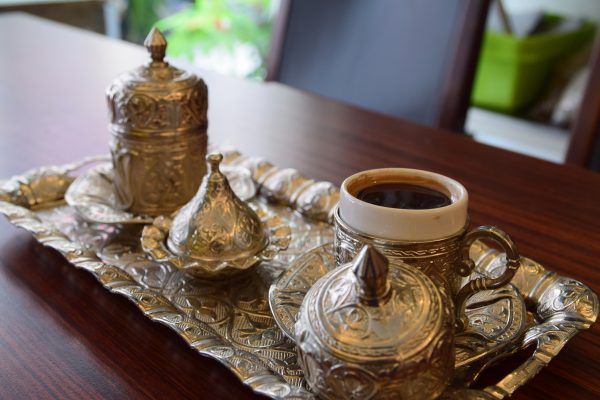
Turkish Coffee: the Culture hidden in the Coffee Cup
Professional baristas Please follow the Coffee Workshop (official Wechat account cafe_style) when it opened two years ago, many Turkish and Taiwanese friends asked us when Turkish coffee would be available. At that time, we also had a skeptical attitude towards Turkish coffee, worried that the strong sense of Turkish coffee would impact on boutique coffee.
Related
- How did the Salvadoran coffee industry develop in Central America?
- What exactly does the golden cup extraction of coffee mean?
- The Origin of Coffee flower
- [2023 Starbucks World Earth Day] there are more meaningful things besides free Starbucks coffee!
- What kind of coffee is there in Spain? 9 Flavors of Spanish Coffee
- Aromatic African coffee| Kenya's coffee culture and historical production area
- Liberica Coffee Bean knowledge: the characteristics of Liberian Coffee beans of the three original species of Coffee beans
- The origin and formula of Spanish latte introduces the taste characteristics of Bombon coffee in Valencia, Spain.
- How to adjust the solution of over-extracted coffee
- What is the tasting period of coffee beans? What is the period of coffee and beans? How should coffee wake up and raise beans?

